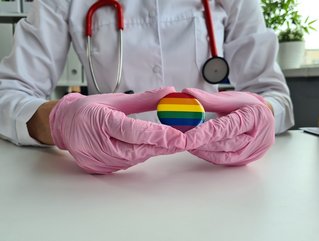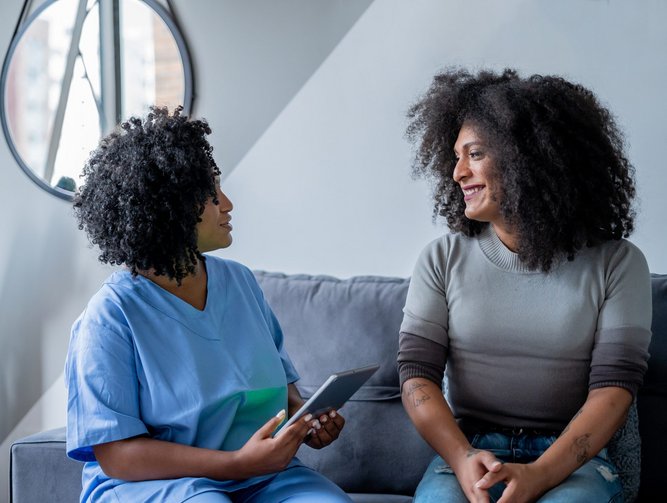Lesbian Visibility Week: health importance before coming out

Note: the phrase ‘queer women’ will be used throughout this article as an umbrella term for individuals who are not heterosexual and/or cisgender
Lesbian Visibility Week was started as a single day, April 26th, in 2008 by Linda Riley, the founder and publisher of Diva Magazine. It has since been extended to a full week (as of 2020) to shine more light on groundbreaking lesbian individuals within the LGBTQ+ community. At Healthcare Digital we want to highlight the significance of this week and raise awareness of the overwhelming inequalities that queer women and LGBTQ+ people face. This article considers the mental and physical effects that being queer-identifying has on an individual and how their health is impacted by the inability to live openly (aka ‘in the closet’).
83% of those who identify as lesbian, gay or bisexual keep their sexual orientation hidden
The LGBTQ+ community continues to face mental and physical stress because of:
- Stigma: more than one-third of LGBTQ+ employees said they have left a job during their lifetime due to facing discrimination
- Discrimination: Half of LGBTQ+ people surveyed reported experiencing some form of workplace harassment, along with 70% of transgender respondents
- Persecution: the recent anti-LGBTQ+ laws in Uganda have made LGBTQ+ laws punishable by death
Healthcare studies have shown the physical impact that being unable to live openly does to queer people. The Yale School of Public Health conducted a survey in 2019 and referred to this as ‘The Global Closet,’ estimating that 83% of those who identify as lesbian, gay or bisexual keep their sexual orientation hidden from all or most of the people in their lives.
This is often the case with those who identify as lesbian, as they are less likely to live openly or be open about their sexuality. Pink News recently shared a survey conducted by Just Like Us, which confirmed that 46% of LGBTQ+ women and non-binary people are only out to their friends and family members. This includes just 44% of women who are out at work, as well as one in four young LGBTQ+ people hiding their sexuality in the workplace.
These studies confirm that this is a time to acknowledge the need for further visibility for LGBTQ+ not only in their professional lives, but their personal lives too. Oftentimes, there are devastating disparities in health outcomes for LGBTQ+ adults. According to The New York Times, there is a body of research that highlights how LGBTQ+ adults are more likely to have worse heart health.

“Global health under-represents the experiences of LGBT+ people” says The Lancet
Lesbian, gay and bisexual adults were 36% less likely than heterosexual adults to have ideal cardiovascular health, the American Heart Association concluded in 2018, based on surveys of risk factors like smoking and blood glucose levels.
The organisation also released a statement in 2021 on high rates of heart disease among transgender and non-binary individuals and linked these elevated rates in part with the stress that comes from discrimination and transphobia.
Physical symptoms connected to sexual orientation, or being in the closet, ultimately result in higher levels of stress. Symptoms include:
- Raised blood pressure
- Lack of sleep
- Hypervigilance. Always feeling on edge or constantly scanning personal surroundings for the next threat are not uncommon for LGBTQ+ people. This can lead to cortisol levels to surge. A risk of this occurring is that it can lead to long-term cardiovascular issues.
Suntosh R Pillay, Joachim M Ntetmen and Juan A Nel told The Lancet that healthcare is not only hetero-cis-normative (catered to heterosexual cisgender people), but global healthcare more broadly “Under-represents the experiences of LGBT+ people.” They surmise that there is a disproportionate burden of physical and psychological health disparities experienced by LGBTQ+ people.
Research like this stresses the importance of weeks like Lesbian Visibility Week. Globally, it is paramount to condemn so-called medical practices like conversion therapy and making continued efforts to maintain visibility for all LGBTQ+ people. Not only that, but it is important to acknowledge both the physical and mental effects that being in the closet has on individuals - especially those who exist in countries where identifying as LGBTQ+ is illegal.
Awareness weeks like Lesbian Visibility Week continue to be necessary and life-changing in terms of social support and developing safe community spaces.
To quote Linda Riley herself: “We are intersectional … The fight is far from over. Let's remember that this is Lesbian Visibility Week, and let's tell the world how proud we are to be who we are.”






